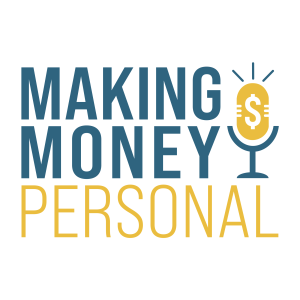Episodes

Tuesday Jan 03, 2023
Start Your Year Right With A Personal Money Review - Money Tip Tuesday
Tuesday Jan 03, 2023
Tuesday Jan 03, 2023
At the end of every year, and the beginning of a new one, we often feel an energy for new resolve. We look back and reflect on the things we accomplished and the things we hope to achieve in the new year.
If there’s anything you should consider starting fresh in the new year, it’s a revised look at your money. And that can’t be achieved without completing a personal money review.
Links:
Open a Triangle Better Checking Account with ID Protect and access to your credit score and report at idprotectme247.com
Learn more about estate planning, insurance, investing and other financial planning services with Triangle Financial Group
Follow our Facebook, Instagram and Twitter pages!
Learn more about Triangle Credit Union
Transcript:
At the end of every year, and the beginning of a new one, we often feel an energy for new resolve. We look back and reflect on the things we accomplished and the things we hope to achieve in the new year. If there’s anything you should consider starting fresh in the new year, it’s a revised look at your money. And that can’t be achieved without completing a Personal Money Review.
Welcome to Money Tip Tuesday from the Making Money Personal podcast.
Sometimes looking back is the way to see forward. Albert Einstein is attributed to saying if you want to know the future, look at the past.
When it comes to the end of the year and the beginning of a new one, it’s good practice to look back in order to learn a few things about your behavior and decide what you want to change or keep the same in the new year.
This is pretty much the way we all make our resolutions. We reflect on the things we didn’t like and decide what we want to try to do differently. This can apply to pretty much any area of our lives, from habits to relationships and most of all our money.
If you’re looking for a way to change something important in your life, start with the way you view your finances. Do a personal money review.
The goal of a personal money review is to take account of your existing financial situation and determine where you think you’ll need to make changes to accomplish your new goals.
So, how do you do a personal money review? Fortunately, it’s not complicated and shouldn’t take a long time.
The first part of a personal money review is to review your income.
You want to take a look at where you made money over the year. This includes your income, bonuses, any dividends, money you made from side gigs, and even any notable gifts like any inheritance.
It may be challenging to collect all this information, but you can start with your latest paycheck and any quarterly statements for investment and bank accounts. Usually these are available to view at the beginning of January so you shouldn’t have to look too far to find them.
Then you add it all up to see how much money you brought in last year.
When reviewing your income, think about specific questions to ask like, Did you make as much as you wanted? Did you meet your savings goals? What are some specific ways to bring in some extra money this year?
Reviewing your income will give you an idea how much you can pull in in a year. If you have an income goal, use this as a gauge to discover how much more you need to bring in to meet that income goal.
The second part of your financial review is to look at your expenses.
Get a sense of what your expenses were throughout the year. If you’re a good budgeter, there shouldn’t be any surprises here, but if you’re new to budgeting this may take a little bit of digging.
Review the expenses you’ve incurred, especially the large ones. You may not be able to count all your expenses, unless you’re THAT organized, but take an account of what you can.
Have your credit card balances gone up? Maybe you’re beginning to charge too much on cards. Did your recurring expenses rise higher than expected? How much has food increased? Has your rent increased?
Take note of the answers to all these questions and calculate how much you’ll need to adjust in order to plan for the next year.
It’s not likely you’ll remember everything, but review anything big as well as your monthly expenses and other annual costs like car registration, life insurance and the like.
The idea of this is to detect certain areas of your spending over the last year that you either forgot about or didn’t plan for and then you should try to avoid those types of situations in the new year or find a way to budget extra for them this time around.
Review your credit report.
Why do you do this? Reviewing your credit report will give you an idea of where you stand from a lender’s perspective. If you’re planning for some big time purchases in the next year, whether it’s a new car, or a new house, your credit score will determine how likely you’ll be able to get financing for those things as well as how good of an interest rate you’ll be able to get.
When you’re looking over your score ask yourself if it’s as high as you would like it to be. If not, review your behavior over the last year and determine possible reasons why it may not be where you want it. Did you miss any payments? Apply for too many credit lines? Run your bills up too close to your credit limit? If some of these sound familiar, look at your credit report and review it for these types of actions.
Many popular credit platforms will assess your credit behavior and provide custom suggestions on what you can do to improve your score.
If you have a Triangle Better Checking account and are registered with ID protect, simply log into idprotectme247.com to see your credit score and view a free copy of your credit report.
If your score isn’t where you want it to be, take some time to draw up a strategy on how you can increase it over the next year.
The last thing you’ll want to do is review any wills or other documents if you’ve experienced any major life events over the last year.
Major life events like marriage or divorce, the birth of a child, death of a spouse, purchase or sale of a house, starting or selling a business or moving to a new state are all events that warrant adjusting a will and other important life documents.
If any of these have occurred in your life over the last year, it’ll be wise to review these documents and accounts to update beneficiary and asset information.
Professionals recommend you review your will and other documents completely every 4-5 years to keep things up to date. In this case, for a financial review, all you’ll need to consider is if anything has changed in the last year that would impact your will, and make a goal to take care of it through the proper channels.
You’ll also want to take a moment to review any of your insurance plans, auto, life, home and others to assess that the coverage is adequate, and the cost is competitive. One rule of thumb is that you should shop for certain types of insurance like auto insurance every two years to make sure you’re still getting a good price. If it’s been more than two years since you’ve explored other options, this year may be the year to try it out.
If you need any help when it comes to setting up a will or changing anything with your estate plan, you can contact our team at Triangle Financial Group. They offer financial planning services that cover everything from estate planning and insurance to investing and retirement.
That sums up this tip on how to do a personal money review.
The whole idea of a financial review is to take some time to reflect on the last year’s finances, the good and the bad, and take the necessary actions to set yourself up financially for the new year.
Set up a strategy for specific changes you want to make in the new year, whether it’s starting a budget, a side gig, increasing your income, building emergency savings, getting out of debt or investing.
Looking back gives you the chance to recognize both your successes and mistakes so you can set up new plans and goals for your future.
If there are any other tips or topics, you’d like us to cover, let us know at tcupodcast@trianglecu.org. Like and follow our Making Money Personal FB and IG page and look for our sponsor, Triangle Credit Union on social media to share your thoughts.
Thanks for listening to today’s Money Tip Tuesday and be sure to check out our other tips and episodes on the Making Money Personal podcast.
Have a great day!

Tuesday Dec 27, 2022
How to Recover From Your Holiday Spending - Money Tip Tuesday
Tuesday Dec 27, 2022
Tuesday Dec 27, 2022
It’s normal to spend money during the holidays. You want to give presents to the people you love to show how much you appreciate them. But now that the holidays are over, and you’ve given out all your gifts, you now have to deal with the financial aftermath. Here are some tips on how to recover from your holiday spending spree.
Links:
Learn more about Triangle's Personal Loan and Personal Line of Credit
Follow our Facebook, Instagram and Twitter pages!
Learn more about Triangle Credit Union
Transcript:
Welcome to Money Tip Tuesday from the Making Money Personal podcast.
The first thing you’re going to want to do is assess your financial situation. See how much money you owe and then start paying off your debt as quickly as possible.
To do this, you might have to change your monthly budget in January around. Make a list of all your debts, payment due dates, minimum payment amounts, interest rates, and when you plan on paying them off. From there, you can restructure your January budget to fit your needs best.
You will probably want to start paying off the credit cards with the highest interest rates first. Don’t just pay off the minimum monthly payment, even if it’s just an extra $10, the more money you put towards every payment the less you’ll owe in the long run and the faster you’ll pay it off. And always make sure to pay on time.
You can also open an unsecured personal loan to reduce the cost of paying back how much you owe. Personal loans typically have a lower interest rate than credit cards do which makes them great for debt consolidation. Triangle Credit Union offers a wonderful personal unsecured line of credit that is a helpful safety net for any unexpected expenses and gives you plenty of flexibility to access funds when you need them for any financial situation.
Did you get a holiday bonus or are you expecting some money from your tax returns? Consider using some of this money to put towards your holiday debt. Don’t consider bonuses or tax returns as money you can just freely spend, but rather view them as money you can save on the side or use to pay for things you’ve already bought.
Once you’ve done all that, now is the perfect time to start thinking about next year’s holiday shopping. Yes, it is a bit early, but if you start planning what to do with your money now, you hopefully won’t need to recover from your holiday spending next time.
One thing you can start doing now is put money aside specifically for holiday shopping. Budget out how much of your paycheck you want to put aside for this fund. By the time the holidays come around, you’ll have a nice amount of money to spend. Plan out what you are going to buy next time so you don’t overspend.
If there are any other tips or topics you’d like us to cover, let us know at tcupodcast@trianglecu.org and don't forget to like and follow our Making Money Personal Facebook, Instagram, and Twitter pages and look for our sponsor, Triangle Credit Union on Instagram and LinkedIn to share your thoughts.
Thanks for listening to today’s Money Tip Tuesday and be sure to check out our other tips and episodes on the Making Money Personal podcast.
Have a great day!

Thursday Dec 22, 2022
Episode 52: Top Five Ways to Handle the Holidays with Terri and Liz
Thursday Dec 22, 2022
Thursday Dec 22, 2022
Do the holidays stress you out? Are you too busy with gatherings and gift giving? Let's take a breath and slow down and talk about ways to handle the holidays.
In this episode Terri and Liz chat about their holiday preparations and discuss a few different ways they handle all the hustle and bustle that comes every holiday season.
Links:
Try using Triangle's popular Personal Loan for purchases or debt consolidation
Use online banking and mobile banking tools to keep track of spending
Explore the Money Management tool for help budgeting and paying down debt
Follow our Facebook, Instagram and Twitter pages!
Learn more about Triangle Credit Union
View episode transcript.

Tuesday Dec 20, 2022
Impulse Buying: Why You Should Take a Lap - Money Tip Tuesday
Tuesday Dec 20, 2022
Tuesday Dec 20, 2022
We’ve all made impulsive purchases before! Impulsive buying is purchasing something that you have not planned to buy before that moment—it can be as small as a pack of gum in the grocery store checkout or as big as a new car when you were “just looking.”
Links:
Check out our other episode Ways to Avoid Impulse Purchasing
Follow our Facebook, Instagram and Twitter pages!
Learn more about Triangle Credit Union
Transcript:
Welcome to Money Tip Tuesday from the Making Money Personal podcast.
During the holiday season, one in three purchases are made on impulse and we admit that buying something impulsively can be exciting in the moment, but it’s the buyer’s remorse that catches up with us after the fact.
Picture this: you’re starting your holiday shopping at the mall and on your way to the specific store when you pass a kiosk that has recently been set up for the holiday season. You stop for a minute to glance at the different items displayed before you. The items are not something you’ve seen before but the price tag is much higher than you want to spend.
The shop owner sees that you are considering buying something but senses your hesitation. They offer you a discount that seems too good to pass up! What do you do?
You may be urged to make a purchase but the smart thing to do is take a lap!
If you’re tempted to make a big purchase without any prior planning, it’s important to take a lap around the store or the mall to think about it before making a big commitment.
Walking away from the high-pressure situation allows you to clear your head and gain a new perspective. You can take some time to think about the practicality of the item and consider if buying it now is beneficial overall. It also gives you the chance to check online to see if you can purchase elsewhere at a lower price.
If you’ve had a chance to weigh the pros and cons of purchasing the item and you still want it, you can buy it when you’ve completed your lap!
There are other ways to stop yourself from impulse buying both online and in-store.
Do your research beforehand to figure out the cost of the item you intend to purchase. Once you know the price, only bring that amount of money in cash to the store with you. Not having extra cash or another form of payment limits you on what you can buy, which saves you from making impulse purchases.
Another way to stop impulse purchases online is to unsubscribe from store emails. Stores will constantly send out coupons or let you know when they are having sales. We’ve all been there. You’re checking your emails and you see an email subject line that reads, “TODAY ONLY! All sweaters as low as $5!”
Many of us would be enticed to visit the website to buy because it seems too good to be true, but if it’s not something you were planning on purchasing, it’s an impulse buy.
These tips are helpful to remember all year round, but especially during the holiday season! In-store window displays become flashier to entice consumers to buy more and retail stores send out more emails with sales and discount codes.
Remember to clear your head, remove yourself from the high-pressure situation and give yourself a day before making purchases.
If you have any comments or ideas for additional tips, please email us at tcupodcast@TriangleCU.org. Be sure to follow the Making Money Personal podcast page on Facebook and Instagram for more great content.
Thank you to our sponsor, Triangle Credit Union, and to you for tuning in!
Have a great day!

Tuesday Dec 13, 2022
Are Homemade Gifts the Best Gifts? - Money Tip Tuesday
Tuesday Dec 13, 2022
Tuesday Dec 13, 2022
You may be crafty and have a niche for making cool gifts, but does that mean you should give your homemade creation to family and friends this gift giving season? It depends. There are some considerations on whether your homemade gift will be well received.
Links:
Follow our Facebook, Instagram and Twitter pages!
Learn more about Triangle Credit Union
Transcript:
Welcome to Money Tip Tuesday from the Making Money Personal podcast.
Your intentions may be great, and if you want to make sure your homemade gift is well received, here are some practical considerations to think about before you spend 8 hours knitting a sweater for your aunt, who lives in Florida and suffers from chronic hot flashes:
STYLE: Is your gift something the recipient would pick out for herself? This is probably the first question in the litmus test. I love to make family ornaments to give to my husband’s seven siblings—the problem is some of his siblings don’t have the same taste that I have. These ornaments have more a modern farmhouse theme, and one sister is a gold leaf gal who loves Italian impressionists, and her Christmas tree is decked out in gold balls. Be considerate of how these gifts may be received. If you can adapt to each one’s interests, then that’s best.
PALATE – No, this does mean pallet furniture. This is about physical taste, as in food gifts. My best friend is a connoisseur of butter crunch and her annual gift of a tin of butter crunch is received with great anticipation and fanfare every year. If you have a special recipe and are excited about sharing the best chocolate walnut fudge recipe ever—do remember those with allergies and plan accordingly.
SIZE – It’s not the size of the box that matters, right? Correct. What’s in the box is more important, but if your daughter lives in a 200 square foot studio, she may have to move if Dad makes her a handmade armoire.
Homemade gifts are heartwarming, sentimental, and cherished. Each gift reflects the giver’s time and effort…and truly, there is no higher commodity than someone’s time. If you make homemade gifts, or are interested in trying something new this season, do a little discovery. What do your relatives want? What are their interests? What’s trending on Pinterest, and here’s a pro tip: Whatever you give, make the unboxing experience amazing! Unboxing has become a gift in and of itself so take the extra time, like you did when making the gift, to create a beautiful gift presentation.
May you have a wonderful time of craft making and enjoy the season of giving! If you have any comments or ideas for additional tips, please email us at tcupodcast@trianglecu.org. Be sure to follow the Making Money Personal podcast page on Facebook and IG for more great content.
Thank you to our sponsor, Triangle Credit Union, and to you for tuning in!
Have a great day everyone!

Tuesday Dec 06, 2022
Five Rewarding Ways to Give Back this Season - Money Tip Tuesday
Tuesday Dec 06, 2022
Tuesday Dec 06, 2022
The holidays are a time of celebration, joy and generosity. This season of giving, take some time to participate in the many charitable activities available to you to bring a little light to someone’s life.
Links:
Check out the American Red Cross to learn more about donating blood
Explore this list of non-profit organizations that could use donations or volunteer support:
The Salvation Army
Make-A-Wish Foundation
The Front Door Agency
Nashua Soup Kitchen, Sonshine Soup Kitchen (Derry),
New Hampshire Homeless Shelters and Food Pantry Directory
Directory of New Hampshire Humane Societies and Animal Shelters
Boys & Girls Club
Meals on Wheels
Harbor Homes (Now Harbor Care)
Follow our Facebook, Instagram and Twitter pages!
Learn more about Triangle Credit Union
Transcript:
Welcome to Money Tip Tuesday from the Making Money Personal podcast.
Giving to others is a rewarding experience that teaches important lessons about generosity and self-sacrifice. Some can cost you money; others are entirely free. However you decide to give back this season, charitable giving is a rewarding and contagious act that can spread joy throughout the community and change people’s lives.
If you’re feeling in the holiday spirit and looking for a few ways to give back to your community, here are some ideas you might find helpful.
You can always donate money to organizations that need those funds to operate. Almost any organization you research could use financial help. They use this money to buy supplies, pay staff and raise awareness for their cause. Many organizations run holiday fundraisers where you can meet people, win prizes and learn more about what they do for the community. You can donate money online through website portals or donate in person when you see a display or presentation. For example, the Salvation Army sets up the Red Kettle fundraiser every year to ask for donations.
Donating money is a great way to help outreach organizations, but there are other ways to pitch in and contribute to individuals and families struggling for everyday items. You can donate clothing, hygiene items and other necessities to organizations like homeless shelters or children’s homes. Winter is one of the most critical seasons for clothing and the most requested items are usually new underwear and socks, warm weather clothing like jackets or sweatshirts, and shoes. Clothing items aren’t the only things needed. Many homeless shelters ask for donations of personal hygiene products, bedding, toys and baby clothes to offer to families with children and other people in need of these items.
If you don’t have the money or extra funds to buy physical necessities, you can still donate to people in need. This idea might make some a little squeamish, but you can donate your blood to a blood bank, most notably the Red Cross. According to redcross.org, somebody needs blood or platelets every 2 seconds. Blood donations provide lifesaving help to people struggling with a wide variety of illnesses and physical ailments. Many individuals fighting cancer, people who need lifesaving surgeries, accident and burn victims all need blood and benefit from blood donors. You may also want to know that one single blood donation can help multiple people. One visit to a blood drive could make the world of a difference to 2 or 3 people in need. For more information on how to donate visit www.redcrossblood.org.
The last way to help others this season is by donating your time by volunteering with a local organization. This can be one of the most rewarding experiences for any age. Studies show it increases dopamine which improves your mood. It also lowers stress and anxiety and can contribute to an overall feeling of well-being and purpose. You also get the opportunity to meet new people and learn more about their lives. It’s rewarding, fun and a great way to touch the lives of people around you. You can help distribute food with Meals on Wheels or try bell ringing with the Salvation Army.
Giving back is a rewarding, positive experience for all parties involved and can spread a lot of positivity and goodwill throughout the community.
If you’re interested in getting involved, here are a few organizations you could consider working with: Salvation Army, Make-A-Wish foundation, the Front Door Agency, the Soup Kitchen, Homeless shelters, your local humane society, Boys and Girls Clubs, Meals on Wheels and Harbor Homes.
There is a vast amount of need all around us. People need assistance and it’s important we show others they matter and that they aren’t forgotten. Many hands make light work and it’s a big help when we can assist those who dedicate their lives to helping others. It improves our environment and brightens our community.
If there are any other tips or topics, you’d like us to cover, let us know at tcupodcast@trianglecu.org. Like and follow our Making Money Personal FB and IG page and look for our sponsor, Triangle Credit Union on social media to share your thoughts.
Thanks for listening to today’s Money Tip Tuesday and be sure to check out our other tips and episodes on the Making Money Personal podcast.
Have a great day!

Tuesday Nov 29, 2022
Ways to Get Extra Holiday Cash for Gifts - Money Tip Tuesday
Tuesday Nov 29, 2022
Tuesday Nov 29, 2022
The holidays can be financially stressful, especially if you’re starting your holiday gift shopping but aren’t confident you’ll have enough to cover for what you’re planning to buy. Luckily, there are still some things you can do to get some extra money for holiday gifts.
Links:
Try exploring some of the many places to sell items online like Facebook Marketplace, Ebay, OfferUp for ideas on what and how to sell
Check out Triangle's Holiday Cash personal loan for low rate holiday borrowing
Follow our Facebook, Instagram and Twitter pages!
Learn more about Triangle Credit Union
Transcript:
Welcome to Money Tip Tuesday from the Making Money Personal podcast.
If you haven’t been saving money over the past year for your holiday gift fund you need to start thinking about how you’re planning to pay for this year’s gift giving.
If you’re looking for a few ways to bring in some extra money this season, here are a few ideas you can try.
The first thing you can do is find some things around your home to sell online. If you have stuff hanging around that you don’t use anymore, try selling what you can on one of the many online selling platforms. With Ebay, Facebook Marketplace, OfferUp and more, you could list your items and bring in some extra cash. Some of the most resalable items include home gym and workout equipment, sports memorabilia, Disney themed items, Star Wars themed items, designer clothing and handbags, Legos and popular kids' toys. Look around to see if you have any unused items in good condition and you could make a little money from.
Another thing you can do to make some extra cash for the holidays is pick up a part-time job or a side gig. Many companies are known to hire people for help during the holiday season. If you have some free weeknights or weekends, you can try getting a temporary position at one of these stores to bring in some extra cash for holiday gifts. If you’re up for something with a little more independence you could also consider a side gig like driving for Uber or Door Dash. These are flexible jobs where you have the freedom to pick up extra work on your own time.
Another way to get extra cash is you can see about picking up some overtime at your work. If your company offers overtime for employees, working a few extra hours could be the perfect way to bring in enough additional cash to cover your gift expenses. Overtime is great because you’ll be paid more per hour so check with your company and see if that is an option for you.
Another, pretty simple way to find money for gifts is to use your credit card points. If you’ve been building up credit card points all year trade them in for cash or other rewards that could help you purchase items. One of my cards lets me use points directly on Amazon so when I go to check out, I apply those points and save money immediately.
A final thing you can do is borrow some money from a bank or credit union. Many financial institutions provide promotional personal loan programs with lower rates so you can borrow money specifically for the holiday season. At Triangle we offer our very popular Holiday Cash personal loan which is a great option to borrow enough money for any kind of holiday expense.
If there are any other tips or topics, you’d like us to cover, let us know at tcupodcast@trianglecu.org. Like and follow our Making Money Personal FB and IG page and look for our sponsor, Triangle Credit Union on social media to share your thoughts.
Thanks for listening to today’s Money Tip Tuesday and be sure to check out our other tips and episodes on the Making Money Personal podcast.
Have a great day!

Tuesday Nov 22, 2022
Is Black Friday Shopping Worth the Hassle? - Money Tip Tuesday
Tuesday Nov 22, 2022
Tuesday Nov 22, 2022
The holiday season is right around the corner, and with it comes the energy and excitement of holiday decorating, shopping and gatherings. If you haven’t already started your shopping yet, chances are you’ll likely start this process with a Black Friday kickoff.
Links:
Check out the seasonal deals at Tom's Guide and blackfriday.com
Learn more about Small Business Saturday and it's history
Follow our Facebook, Instagram and Twitter pages!
Learn more about Triangle Credit Union
Transcript:
Welcome to Money Tip Tuesday from the Making Money Personal podcast.
Some people love the hustle and bustle of the holiday shopping season. There’s an energy and excitement surrounding the rush to find the perfect holiday gifts, and there’s no day more notoriously associated with holiday shopping than Black Friday.
Whether you love it or you hate it, the Friday following Thanksgiving is THE day that kicks off the holiday shopping season.
But, with all its flaws, and the rise of the internet, has Black Friday fallen out of favor among holiday shoppers and is Black Friday shopping still worth the hassle?
Putting aside the obvious downsides like long wait times, busy traffic and the occasional fight in the aisle, there are still some benefits of shopping on Black Friday.
The first is that you can still get some great deals. If you do your research ahead of time for some specific items, you could really make out when you take the time to shop at various stores. Exploring store ads and websites will give you a good idea of what items will be on sale and where you can get them.
A benefit to doing your Black Friday shopping in-person is that, if you get there in time, you’ll walk out of the store with the item you wanted. You don’t have to wait until it’s shipped and delivered. Some stores may advertise a “buy online pick up in store” offer, so keep an eye out for these if you want to cut your in-person wait time.
One great thing about Black Friday today is that most offers are now both in-store and online. So you don’t HAVE to visit the store in-person to get a good deal. Inernet shopping has truly revolutionized the holiday shopping experience. Many stores have started offering Black Friday deals early, so you can take advantage of the savings days and sometimes even weeks in advance.
You can start exploring deals through online resources like BlackFriday.com and tomsguide.com to get an idea of what kinds of items are for sale and how much they’ll be discounted.
One final notable thing about Black Friday is that some people see it as a social event to kick off the holidays. You can take the time to shop with friends and family which carries with it a form of personal value. Just make sure you plan out where you’re going and when so you don’t get stuck trying to make decisions on the fly which could take your trip from fun to frustrating.
As a side note, Black Friday isn’t the only day to score some big deals for your holiday shopping. You may find some on these other days, Cyber Monday and Small Business Saturday.
Cyber Monday is beginning to replace Black Friday as one of the busiest shopping days of the year. It occurs the Monday after Thanksgiving and is made entirely of online deals. It’s a super convenient option for many online shoppers with some deals being better than Black Friday. Just keep in mind that items are usually limited so make sure you log on in time and checkout before the deals disappear.
If you’re not a fan of the over-commercialization by large corporations, try participating in Small Business Saturday which encourages shoppers to support small businesses in a variety of different ways. This is on the Saturday following Thanksgiving and is intended to encourage shoppers to support the small businesses around the country who work hard to provide goods and services to their communities. It’s worth checking out.
So, going back to Black Friday, is it really worth the hassle? That’s entirely up to you. If you like the energy and the excitement of joining the hustle of Black Friday shopping, then by all means participate. Black Friday carries a lot of traditions and memories for many so if you’re doing it for the fun, you’ll enjoy yourself regardless.
What makes Black Friday better is that now with the massive ecommerce platforms on the web, you can participate and score some of those great deals without even having to leave your home.
If you do choose to go out for Black Friday this year, I hope you’ll be safe, have fun and score some great holiday savings.
If there are any other tips or topics, you’d like us to cover, let us know at tcupodcast@trianglecu.org. Like and follow our Making Money Personal FB and IG page and look for our sponsor, Triangle Credit Union on social media to share your thoughts.
Thanks for listening to today’s Money Tip Tuesday and be sure to check out our other tips and episodes on the Making Money Personal podcast.
Have a great day!

Thursday Nov 17, 2022
Episode 51: Creating Consistent Marketing Messages for Business with Terri and Liz
Thursday Nov 17, 2022
Thursday Nov 17, 2022
Multi marketing channels are essential for business to expand their brand and reach.
In this episode Terri and Liz discuss the importance of using these channels and why it's imperative you have consistent messaging in your marketing.
Links:
Check out platforms like Fiverr and Upwork for freelance help with a wide variety of marketing and business needs
Follow our Facebook, Instagram and Twitter pages!
Learn more about Triangle Credit Union
View episode transcript.

Tuesday Nov 15, 2022
Tips to Avoid Scalpers this Season - Money Tip Tuesday
Tuesday Nov 15, 2022
Tuesday Nov 15, 2022
During the holiday season, it isn’t uncommon for a popular toy, game console, electronic device, or other popular gift to be sold out quickly. Unfortunately, some people like to take advantage of your holiday spirit and raise the price of popular products. Here are some ways to avoid scalpers and price gouging this holiday season.
Links:
Check out CamelCamelCamel to keep an eye on price fluctuations
Check out our Holiday Shopping Quiz Money Tip Tuesday episode to check your fraud prevention skills
Follow our Facebook, Instagram and Twitter pages!
Learn more about Triangle Credit Union
Transcript:
Welcome to Money Tip Tuesday from the Making Money Personal podcast.
Scalpers are people who figure out what the hot gift Items of the year are, buy a bunch of them until the stores are sold out and then sell the items at an upcharge of anywhere from a 50% to 200% increase. Some scalpers even use bots to buy up popular gift items and then list them from double to ten times the suggested retail price, not giving shoppers a fair chance to even click the purchase button.
It may be tempting to buy from them so you can get your hands on that gift, but don’t do it. Buying from them helps their scheme and also encourages other people to do the same. Also, if the scalpers see that people are buying at already ludicrous prices, it's probable that they will keep increasing the prices as their stock gets lower.
Want to avoid scalpers and getting price gouged? One thing you can do is get your holiday shopping done early. If you know what you plan on getting someone and you see it available, buy it before it’s too late.
Always know what the suggested retail price of the product is and what the trend of the price is. You’re less likely to get extorted this way. Camelcamelcamel offers an Amazon price tracker so you can see how much the price has changed and shop accordingly. There may be small price fluctuations based on the product’s availability but at least if you use this tool, you know you’re more likely to get a fair price.
Also make sure to be aware of who you are buying from. Places like Amazon and Walmart offer a lot of third-party sellers which may not be as trustworthy and up the price of hot items. If you can’t find the hot gift anywhere, but then see it on a website you’ve never heard of at a reasonable price, it’s probably a scam and not a legitimate store.
Want to know if you know how to shop safely online? Check out our online holiday shopping quiz and see how you do!
If there are any other tips or topics you’d like us to cover, let us know at tcupodcast@trianglecu.org and don't forget to like and follow our Making Money Personal Facebook, Instagram, and Twitter pages and look for our sponsor, Triangle Credit Union on Instagram and LinkedIn to share your thoughts.
Thanks for listening to today’s Money Tip Tuesday and be sure to check out our other tips and episodes on the Making Money Personal podcast.
Have a great day!

Financial Lessons & Tips
Join us for fun, relevant financial topics that provide you with resources to help you make financial decisions. The Making Money Personal Podcast talks about the impact that money has on your personal and professional life. Our podcast examines trends and topics with support from industry professionals.





